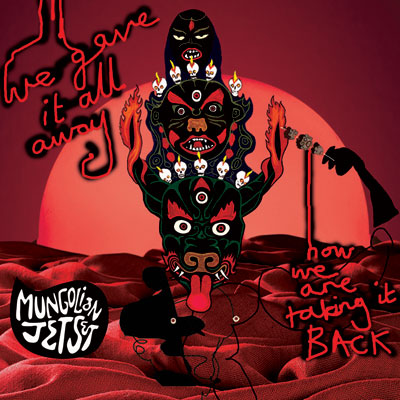Just before I sat down to start collecting thoughts about this extensive collection I was reading a copy of legendary flagship zine of the acid house epoch, Boy’s Own. Okay, it was a reprint – I was eight when it came out, I think – but anyway, it talks most favourably of the then-barely-codifed notion of ‘Balearic’ and its shunning of boundaries in DJ sets, at a time when genres were defining themselves with more regularity and more rigidity. "Balearic isn’t a style of music but an attitude and an awareness of diverse dance tunes that few DJs actually have. What’s wrong with a club where you can hear A Split Second, Ten City, Front 242, Ce Ce Rogers and the Thrashing Doves all in the same night? Sure beats sexist, homophobic, big dick rap. At least we think so."
Mungolian Jetset may or may not like big dick rap – but they seem to like most types of music you can cheerfully dance to. In this respect they are one of the premier contemporary movers honouring the intentions of the late-80s Balearic OGs. Other notables, like The Orb (both as club promoters and live act) and Rob Da Bank’s Sunday Best sessions, have woozily nodded to this over time; the Jetset, a five-year-old ‘collective’ from Oslo centred round Pål Nyhus and Knut Petter Sævik, hoover this legacy up on We Gave It All Away Now we Are Taking It Back, along with pretty much everything else in their vinyl-paved path. Two CDs, both just under an hour long and both featuring eight tracks: a majority of the total 16 – all but one of CD 2 – are either collaborations or remixes. The line they walk, reliably as an innocent drink-driving suspect, between preserving the décor of the source version and spattering their tag all over the surface area, is mightily impressive and demonstrative of why they keep getting work.
Compared to a lot of the epic disco-soaked prog reassemblers out there at the mo – Prins Thomas, Hatchback, the remixed-on-here LSB for three – Mungolian Jetset are decidedly less interested in being tasteful and demure in their process of reclamation. Their humour is equally self-celebratory and self-mocking, almost aggressively goofy, daring you to think that this might be a quick giggly fix that you’ll blushingly file away along the line. Their sheer production nous ought to mean this shouldn’t be so, and anyway this is music for THE MOMENT, so live in it.
Highlights: ‘Creepy’ isn’t really creepy at all, subsisting on a rich diet of squishy acid loops mixed with fizzingly LIVING Tom Tom Club percussive springloadery. Listed as a Bob Marley cover in the CD booklet, although you’d scarcely realise, ‘Could You Be Loved’, the one track here where they use another pseudonym (Pizzy Yelliott), deploys similar Hardfloor-blowing acid bombs in between pitch-wrenched voices being all "shut the fuck up man" and "it’s your birthday – everybody reach up" and – projecting hard here, aye – basically throwing a bone to the early morning monger who can’t stay away from the amyl and those stupid balloons and wants something to laugh along with. ‘Clairevoyage’, CD 1’s closing track, ropes in Lindstrøm and American experimental pop dilettante Dominique Leone for a large Afro-house jam (earlier part of the song) and helium-filled-studio diva-space-disco (later part).
Sometimes MJS are the guys roped in to offer some sort of dancefloor translation, such as ‘Ocean 0306’, where they reshuffle the deck-shoed swishiness of their yachtronica (I just invented that) mates Athana in a manner that, it should be said, would not frighten any known Groove Armada enthusiast. (For what it’s worth, the pair’s remix credits include Shirley Bassey and Bebel Gilberto, so don’t think they’re at all set on confining themselves to the young and taste-correct space disco underground.) Elsewhere they file down the edges of outfits like the indieish Shortwave Set and spin them out into a murky ionosphere. There doesn’t appear to be a tangible limit to what future splendour they might achieve, on this evidence: sure, they might disappear up their own fundament like the Orb or get stuck in a guest-vocalist purgatory like Basement Jaxx, but – again – that is not to concern oneself with now. Clubland may never again profit from giddy naivete as in the late 80s, but its spirit won’t be toasted with much greater vigour than this.


